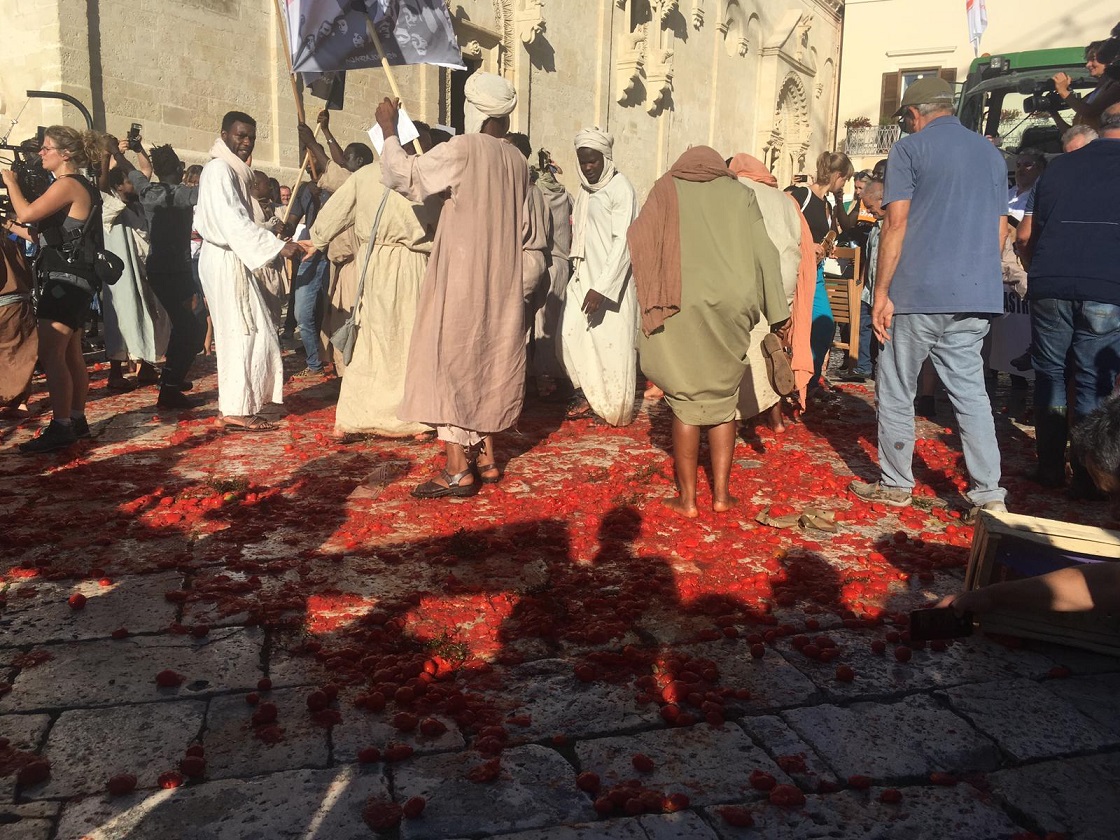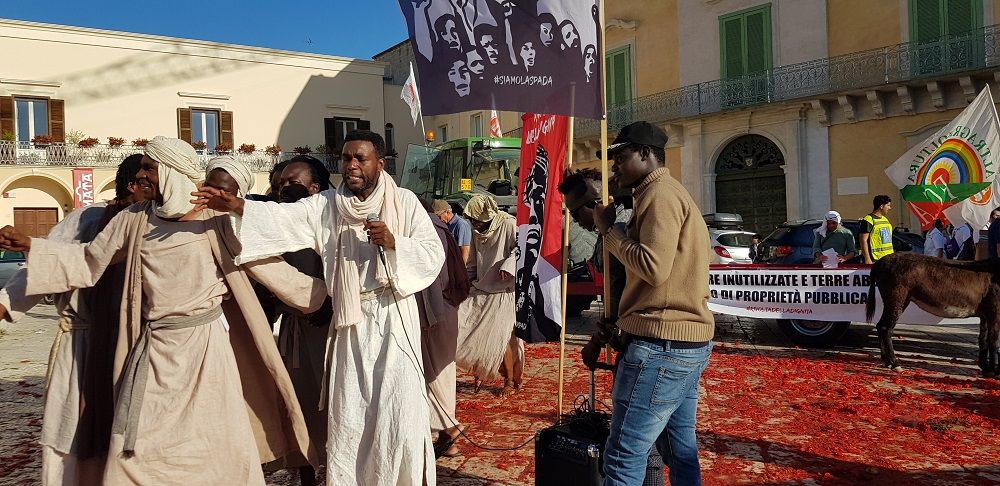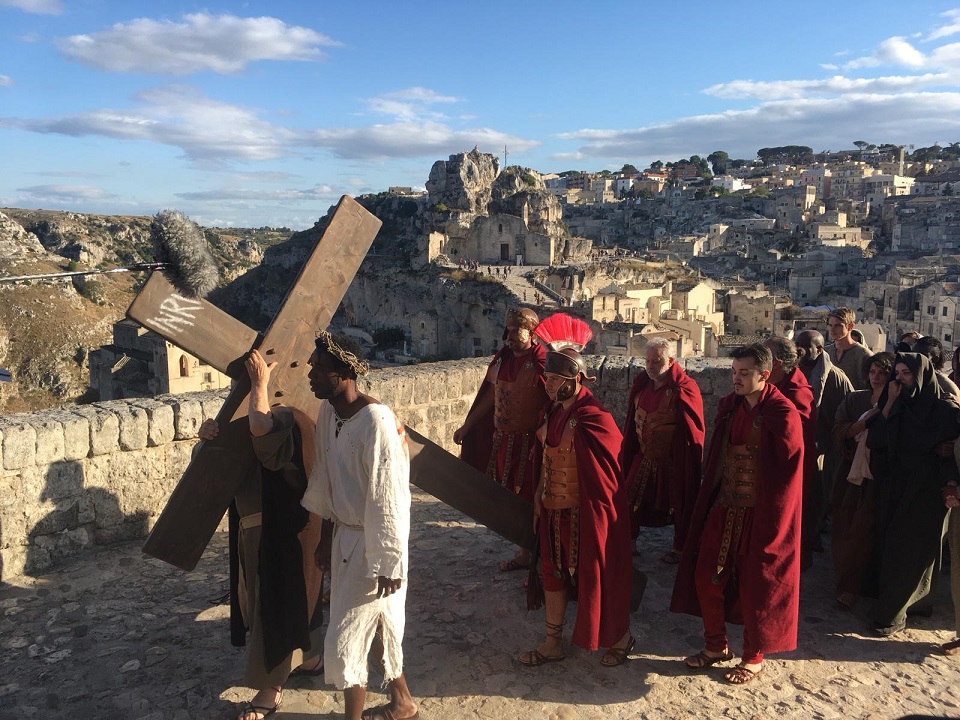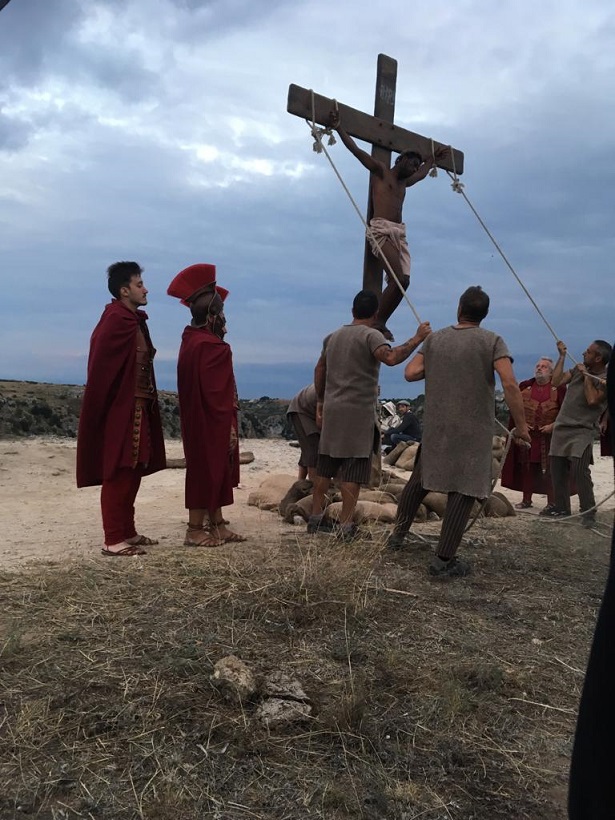La storia si ripete. Con la crocifissione presso il belvedere di Murgia Timone, nel parco della Murgia Materana, si sono concluse nel pomeriggio le riprese del docufilm “Il nuovo Vangelo” di Milo Rau per il progetto “Tòpoi. Teatro e Nuovi Miti”.
Nel classico sito delle crocifissioni del “Vangelo secondo Matteo” di Pasolini e della “Passione” di Mel Gibson si è svolta anche la scena della crocifissione de “Il Nuovo Vangelo” di Milo Rau.
Due giorni intensissimi (il 5 e 6 ottobre) che hanno visto cittadini e turisti avvicinarsi con grande cusioristà al set e prendervi parte in alcuni momenti su richiesta dello stesso Milo Rau che, nel suo lavoro, vuole avvicinare l’esperienza di Cristo a quella della società moderna.
Condannato dalle autorità religiose, quindi consegnato al potere mondano e a Ponzio Pilato (Marcello Fonte), Gesù (Yvan Sagnet) rifiuta di cambiare le sue convinzioni, viene torturato e condannato a morte. Viene quindi condotto attraverso la città fino alla croce attraverso la sua via crucis a cui hanno preso parte attori, comparse e pubblico locale.
Una Via Crucis che ha ripreso completamente il tragitto della via crucis pasoliniana del Vangelo secondo Matteo e in cui il Sindaco di Matera, Raffaello De Ruggieri ha interpretato il ruolo di Simone di Cirene portando sulle sue spalle la croce.
Le scene della Passione nel progetto di Rau sono dominate da un realismo politico: la sofferenza di Gesù è spinta all’estremo. Le accuse da parte di Ponzio Pilato e dei sacerdoti del tempio sono tratte solo parzialmente dalla Bibbia e si riferiscono invece chiaramente alla situazione disumana dei profughi. Così le reazioni degli spettatori (i turisti, la “borghesia europea”) diventano tema stesso di discussione.
Nel cast di Rau anche l’attrice rumena Maia Morgenstern nel ruolo di Maria come nella “Passione” di Mel Gibson; il sacerdote eritreo Mussie Zerai impegnato in attività di salvataggio dei migranti nel Mar Mediterraneo nel ruolo di Giuseppe d’Arimatea e Enrique Irazoqui, conosciuto per essere stato Gesù nel lavoro di Pier Paolo Pasolini nel ruolo di Giovanni Battista.
Struggente la scena della crocifissione, girata sul Belvedere Murgia, nello stesso scenario utilizzato da Gibson e Pasolini.
Il progetto, che unisce teatro, cinema e una campagna politica, arriva adesso alla fase finale con l’assemblea politica a Roma il prossimo 10 ottobre al Teatro Argentina (sold out).
“Il Nuovo Vangelo” di Milo Rau, parte del progetto di Matera 2019 “Topoi. Teatro e Nuovi Miti”, è una produzione interdisciplinare composta da una performance e un film. A “Il Nuovo Vangelo” si lega anche una campagna, “La Rivolta della Dignità”.
La performance è una co-produzione di IIPM – International Institute of Political Murder con Fondazione Matera Basilicata 2019, Teatro di Roma e NTGent in collaborazione con Teatri Uniti di Basilicata, Fruitmarket e Langfilm con la partecipazione di ProLoco Ginosa, Universität für angewandte Kunst Wien
La campagna è organizzata da IIPM – International Institute of Political Murder con Associazione No Cap – Contro ogni forma di caporalato, Ghetto Out Casa Sankara, Spin Time Lab Roma, Osservatorio Migranti Basilicata, Agricola Leggera, Campo Libero, altragricoltura – Confederazione per la Sovranità Alimentare, UILA Taranto – Unione Italiana lavoratori agro alimentari con la partecipazione di European Alternatives, European Center for Constitutional and Human Rights (ECCHR), Medico International, FUTURZWEI – Stiftung Zukunftsfähigkeit.
Il progetto cinematografico è una produzione di Fruitmarket e Langfilm in co-produzione con SRF SSR, ZDF in collaborazione con Arte, IIPM – International Institute of Political Murder, Fondazione Matera Basilicata 2019, Consorzio Teatri Uniti di Basilicata e Teatro di Roma
Con il supporto di Kulturstiftung des Bundes, European Cultural Foundation, Film- und Medienstiftung NRW, Office of Culture (FOC), Zürcher Filmstiftung, DFFF – Deutscher Filmförderfonds, Kanton St.Gallen Kulturförderung / Swisslos, BKM – Die Beauftragte der Bundesregierung für Kultur und Medien, Volkart Stiftung, GEA – Waldviertler, Stadt Lausanne und Kanton Waadt, Fondo Etico di BCC Basilicata.
La fotogallery delle riprese della crocifissione per il film “Il nuovo Vangelo” di Milo Rau (foto www.SassiLive.it)
- Metaponto, Italy. Milo Rau (standing in black shirt) rehearses with Jesus (Yavn Sagnet, center with bottle) and his Apostles the film scene of the Last Supper. Apostles (actors) from the left to the right: Thomas (Alexander Marfo), Jude Thaddeus (Souleiman Mohammad), Andrew (Mbaye Ndiaye), Bartholomew (Vito Castoro), Peter (Papa Latyr Faye), Judas Iscariot (Samuel Jacobs), John (Jeremiah Ogbeide), Jesus (Yvan Sagnet), Jacob (Anthony Nwachukwu), James the Minor (Marie-Antoinette Eyango), Philip (Ali Soumaila), Matthew (Yussif Bamba), Simon (Kadir Nasir Alhaji) About the film project: In Matera, in southern Italy, where the great Jesus films from Pasolini to Gibson were shot, the director Milo Rau is staging a modern Passion of the Christ: “The New Gospel“. What would Jesus preach today? Who would his disciples be? Led by political activist Yvan Sagnet, a new Jesus movement is fighting for the rights of migrants who came to Europe across the Mediterranean to be enslaved on the tomato fields in southern Italy and to live in ghettos under inhumane conditions. Rau and his team return to the origins of the gospel and stage it as a passion play of an entire civilization. An authentically political as well as cinematic “New Gospel” emerges for the 21st century. A manifesto of solidarity with the poorest, a revolt for a more just, humane world.
- Near Matera, Italy. On set for the Satan (Francesco Piglnalosa) meets Jesus (Yvan Sagnet in white) scene with the camera team of Milo Rau. Milo is in center holding a screen. About the film project: In Matera, in southern Italy, where the great Jesus films from Pasolini to Gibson were shot, the director Milo Rau is staging a modern Passion of the Christ: “The New Gospel“. What would Jesus preach today? Who would his disciples be? Led by political activist Yvan Sagnet, a new Jesus movement is fighting for the rights of migrants who came to Europe across the Mediterranean to be enslaved on the tomato fields in southern Italy and to live in ghettos under inhumane conditions. Rau and his team return to the origins of the gospel and stage it as a passion play of an entire civilization. An authentically political as well as cinematic “New Gospel” emerges for the 21st century. A manifesto of solidarity with the poorest, a revolt for a more just, humane world.
- Matera, Italy. Milo Rau (second right) shocked by a snake killing of one of the Apostles. Jesus and other Apostles at the announcing of entering Jerusalem scene. About the film project: In Matera, in southern Italy, where the great Jesus films from Pasolini to Gibson were shot, the director Milo Rau is staging a modern Passion of the Christ: “The New Gospel“. What would Jesus preach today? Who would his disciples be? Led by political activist Yvan Sagnet, a new Jesus movement is fighting for the rights of migrants who came to Europe across the Mediterranean to be enslaved on the tomato fields in southern Italy and to live in ghettos under inhumane conditions. Rau and his team return to the origins of the gospel and stage it as a passion play of an entire civilization. An authentically political as well as cinematic “New Gospel” emerges for the 21st century. A manifesto of solidarity with the poorest, a revolt for a more just, humane world.
























































